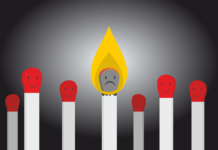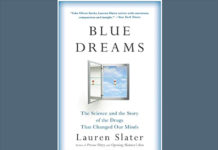Transcranial Magnetic Stimulation No Better Than Placebo for Treatment-Resistant Depression
A new study in JAMA Psychiatry found that transcranial magnetic stimulation was no better than placebo for treatment-resistant depression.
Anti-Stigma Campaigns Enable Inequality, Sociologists Argue
Scholars contend that stigma functions as a mechanism of power in analysis of UK Heads Together mental health campaign.
In Defense of Healthy Depression
With the increasing medicalization of depression, and as more and more physicians see the treatment of depression as falling under their purview, it is imperative to distinguish between actual clinical depression and "healthy depression" — the adaptive and expectable responses to distressing life events that signal a need for rethinking one's life and recalibrating one's self-perceptions and emotions.
Peter Groot and Akansha Vaswani: Tapering Strips and Shared Decision-Making
Doctoral candidate Akansha Vaswani interviews researcher and geneticist Dr. Peter Groot, who has led the development of Tapering Strips, a novel and practical method by which people taking certain prescription medications can gradually reduce their dosage.
Police Killings Vicariously Impact Mental Health of Black Americans
New research provides evidence that police killings of unarmed Black Americans impact the mental health of Black Americans.
“The Lion King” Psychiatrized: What If Psychiatry Had Gotten Its Hands on Simba?
It is time for a new strategy. Rather than try to get adults to question their entrenched beliefs, why not reach out directly to not-yet-fully-indoctrinated kids? This could be done by creating psychiatrized versions of their favorite films that show how ridiculous and harmful the medical model is. Scene 1: Annoyed by Simba's exuberance, Mufasa takes him to Rafiki, the monkey psychiatrist.
FDA Defends Decision to Approve Digital Aripiprazole
Members of the U.S. Food and Drug Administration’s Psychiatry Products division go on the defensive in a new article, responding to concerns about the agency’s approval of digital aripiprazole.
The Creation of an Illness: Video Games and Defining Addiction
Part of what we mean when we say something is socially constructed is that the existence of an entity, in this case a specific medical condition, partly or wholly depends on certain social attitudes, beliefs, or reactions towards that entity. In this particular case, a mental illness exists if and only if it causes certain types of distress that we get to define.
Addressing Depression and Heart Disease with Exercise and Physical Activity
A new study examines the effects of midlife exercise on depression and cardiovascular health later in life.
Early Attention to Life Circumstances and Relationships Improves Outcomes for Psychosis
Coordinated care with employment support and family therapy leads to superior outcomes for those diagnosed with psychotic disorders.
“The Angry Consumer”: Embracing Difficult Conversations
Judgments of the so-called ‘angry consumer’ deeply reinforce divisions within mental health policy and services. The only way we can engage in meaningful co-production is not to gloss over histories of collective exclusion and disempowerment and all the pain and anger that goes with it, but rather to validate and work through difficult emotions.
The Drugging of Migrant Children: A Symptom of a Systemic Issue
Isolation, demeaning behaviors on the part of staff, forced injections and tranquilization — former patients of detention and residential facilities have been describing this inhumanity as the norm for decades. It is our acceptance of this as a norm that allows for abusive situations to arise so easily.
Selling Nicotine on a Psych Ward
A psych hospital is like any other institution of total control. You have locked doors around you, there are guard-like mental health workers, and you only have so many ways to get by. Some people choose to sleep all the time. Some people choose to pace. And some people choose, given the right time and the right opportunity, to learn to steal or to get by in other ways.
Drug Treatment in Medicine and Psychiatry: Papering Over Important Differences
The treatment of mental disorders with drugs is not the same sort of activity as the use of drugs in medicine. The ethical implications of the two situations are different. Insisting on equating the two obscures these differences and presents the use of drugs for mental distress as less controversial than it actually is.
Can Mindfulness Help With Burnout?
A new study investigates the effects of mindfulness-based interventions on employee’s wellbeing across different workplace environments.
Research Finds Parents’ Trauma May Impact Children’s Health
Study uncovers some of the intergenerational consequences of adverse childhood experiences (ACEs).
How to Help Someone Who is Suicidal
Together, we can hold individuals who are plumbing the depths of their pain and help them to transform it. We can show them that there is another, med-free way to accept themselves and that there is precedent for what it looks like to break free from psychiatry, its labels, and consciousness-warping chemicals.
Citizens Petition Calls for Sexual Side Effect Warnings
Researchers take action after study exposes enduring sexual dysfunction as a potential side effect of serotonin reuptake inhibiting antidepressants, 5α-reductase inhibitors, and isotretinoin.
Reappropriating Bipolar Beyond Pathology
It’s still not easy for me to say, “I’m bipolar.” Know that I’m bipolar for good reason, reappropriating a painful word, so those in pain can find me—so you can find me. This is how I reappropriate a term used to strip me of my humanity, a term used to sell me counterfeit versions of reality. I refuse to let go of a label that helps me find my people, no matter how painful it is to retain.
Questioning the Philosophical Assumptions of Neuroscience Research
Are philosophical misunderstandings behind the failure of neuroscience to provide useful clinical research?
Psychological Research Suggests Systemic Interventions to Tackle Racism
A new special edition positions psychological science as offering valuable contributions to the study of contemporary racism.
Still Seeking a Chemical Cure After All These Years: Lauren Slater’s Blue Dreams
Blue Dreams offers a history of the development of psychiatric drugs, but is partly a memoir of the demise of the author's health during the decades she spent on psychiatric drugs. At the time of writing her memoir, Slater is not yet at the point of realizing that the mental health system is not a productive place to go for answers to depression.
Hospitalized and Heading Toward Homelessness
Upon my release I was dumped at a motel with no ID, no money or method of payment, and not even a cell phone to call friends or family for help. My belongings were still locked in a safe back at the hospital. Where are the real advocates for more low-income housing, and where the hell have they been for those who are incarcerated, whether it be in jails and prisons or mental facilities?
Using the Power Threat Meaning Framework in Mental Health Nurse Education
Scholars call for international mental health nurse curriculum to shift to a rights-based approach and teach the Power Threat Meaning Framework.
Researcher Critiques Misleading Media Coverage of Lancet Antidepressant Meta-Analysis
The BMJ’s clinical editor takes issue with uncritical media coverage of antidepressant network meta-analysis, outlining reporting missteps.
































